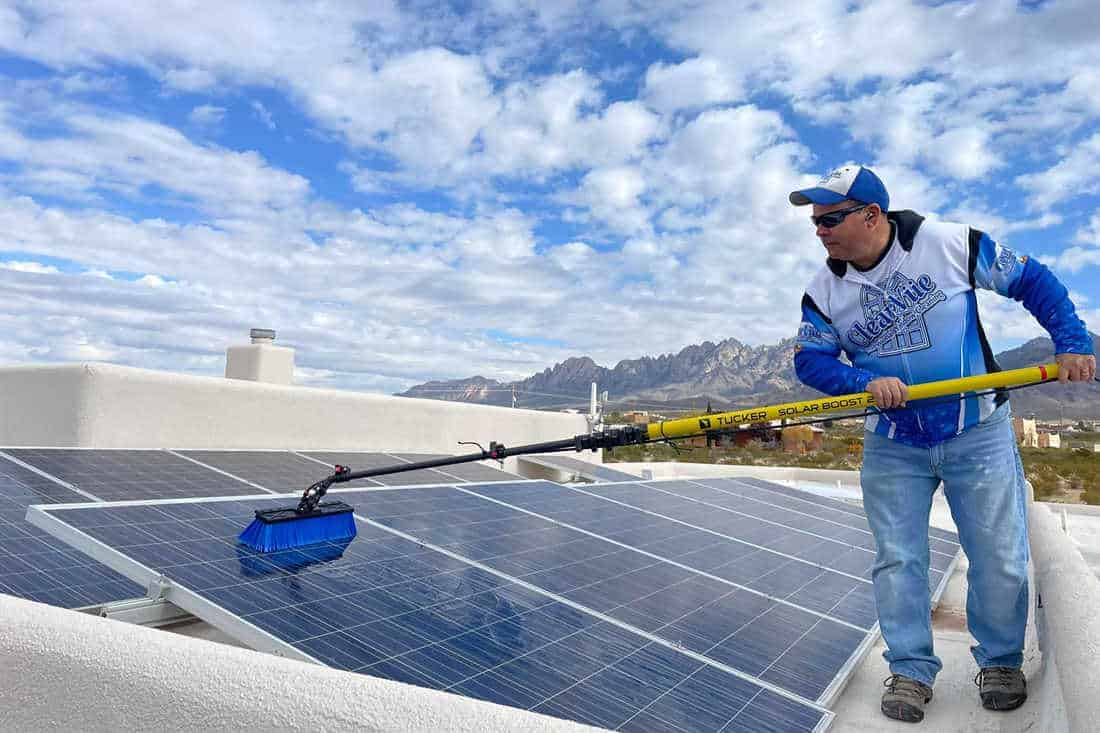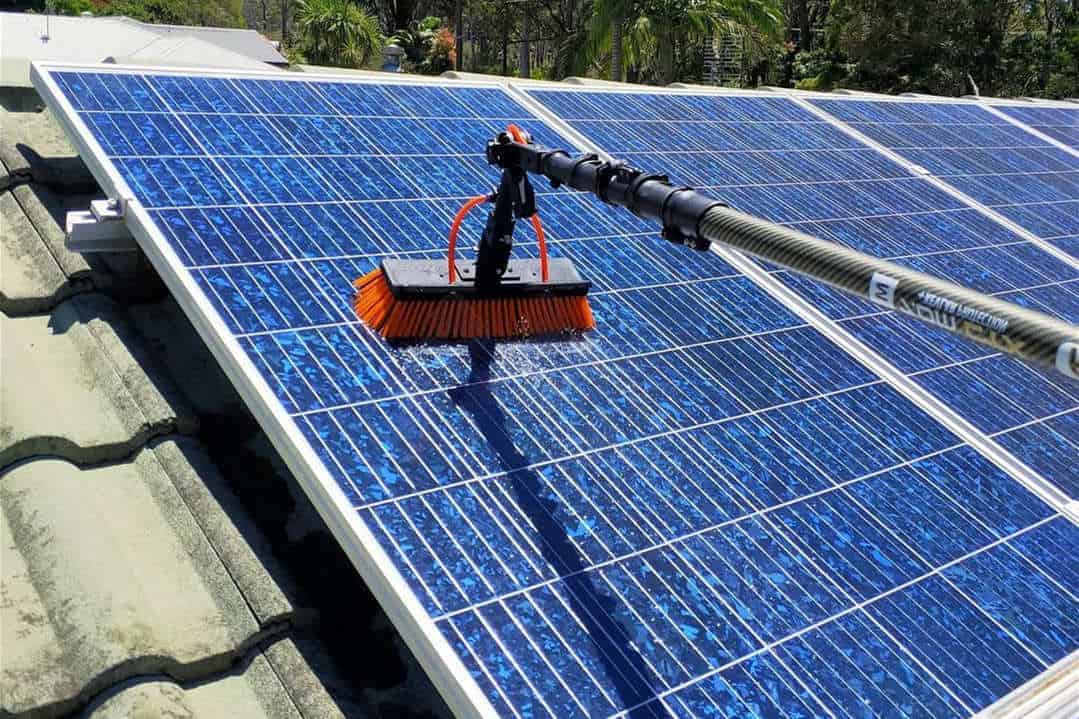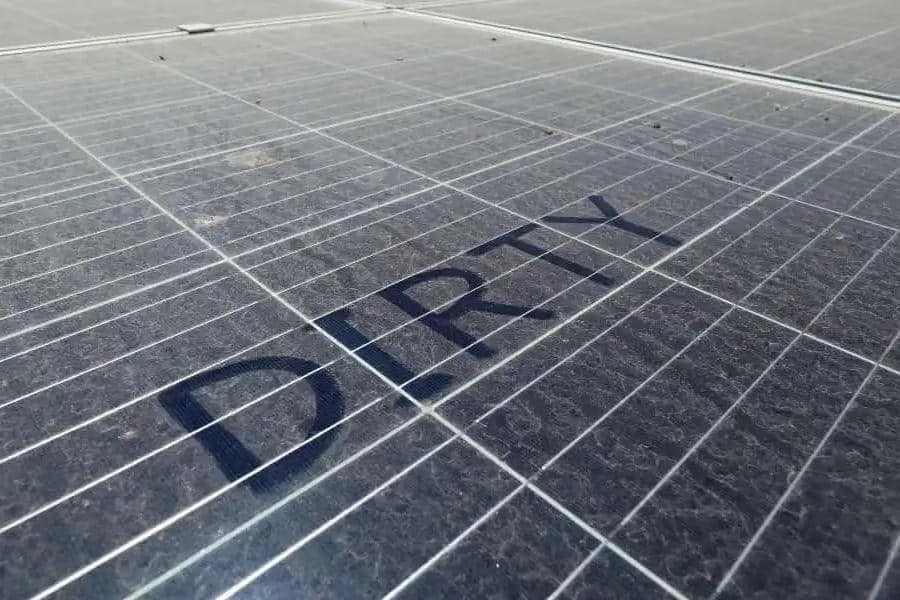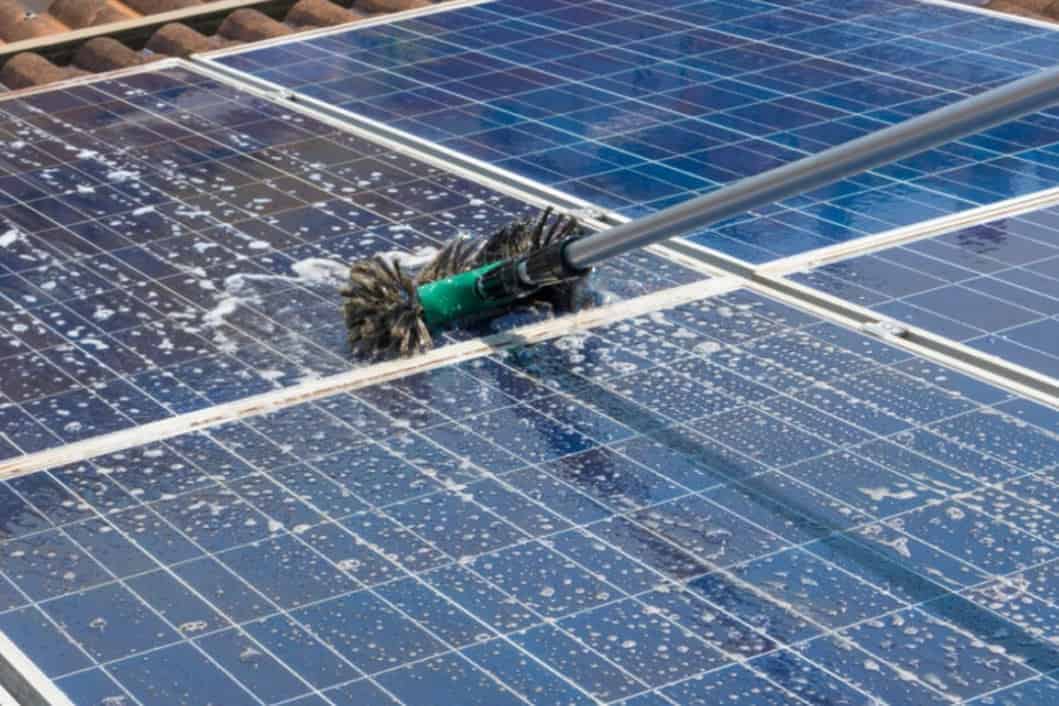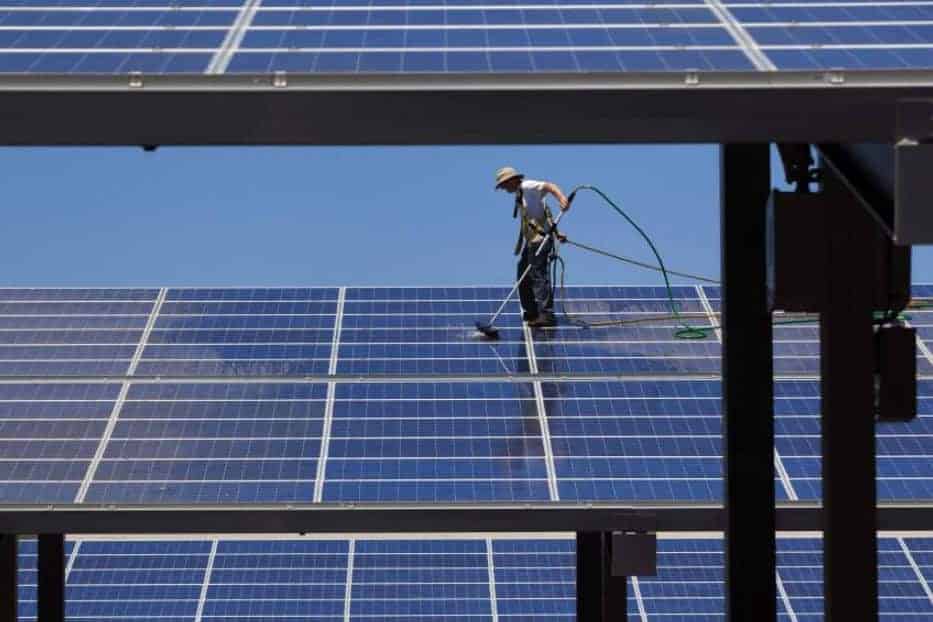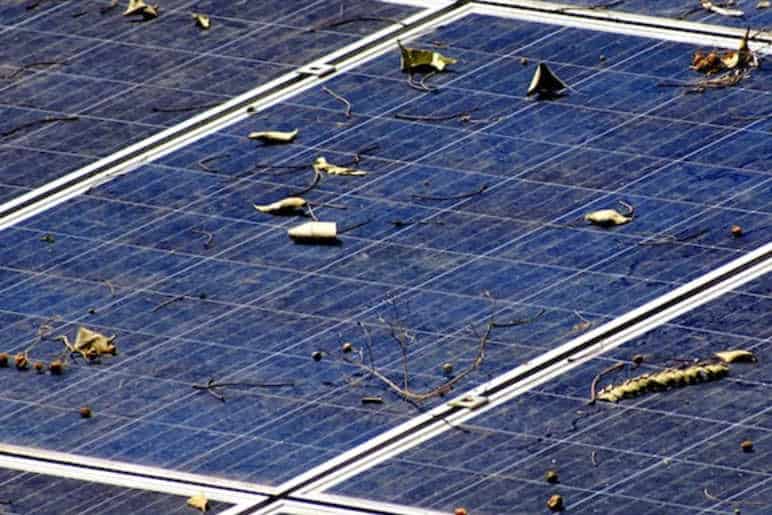If you’re like many solar panel owners, rain is probably your only cleaning option—unless you live in California. But to get the most ROI from your solar system, you need a more effective cleaning solution. And that’s why you’re here.
You can clean your solar panels using some gentle soap, water, and a mop with a microfiber cloth. A garden hose comes in handy, especially on a sloped roof. However, if your system is hard to reach or needs a high climb, you should hire professional cleaning services.
In this guide, I’ll tell you how to clean your solar panels on your own and when to outsource the task to qualified professionals. I also share some tips to make the process easier for you.
Why Cleaning Solar Panels is Important
Cleaning your solar panel is an essential step in its upkeep process. It helps you make sure the system is working at its full potential and efficiency. Here’s why cleaning your solar panel is a must.
Effect of Dirt and Debris on Solar Panel Efficiency
Your solar panel is made up of several photovoltaic cells that absorb the sun’s energy and convert it to electricity. While a range of factors can affect the cells’ efficiency in absorbing light, dirt and debris are among the most influential.
Dust particles accumulate over time and form a layer that cuts the cells’ ability to convert energy. That’s why you’ll get an efficiency boost if you clean your solar panel after a long time,
Longevity and Lifespan of Solar Panels
Built-up dust and particles damage your solar panels in different ways. For example, a thick layer of dust on the photovoltaic cells will act as a barrier that prevents the cells from cooling down when required. The trapped heat is the number one cause of PV cell failure.
What’s more, bird droppings can prove to be harmful to the longevity of solar panels. Due to its acidity, bird poop can corrode the surface of the PV cells if they sit on the panel for too long.
Safety Considerations
Here’s an indirect benefit of keeping your solar panels clean: safety. When you regularly clean the system, you’re more likely to catch damages early on before they turn into big problems. For example, if there’s a dent or crack on the panel, water can get inside and increase the risk of electrocution or fire. The earlier you catch this, the safer your system will be.
Factors Affecting Solar Panel Dirt Accumulation
No two solar energy systems are identical in the amount of dirt and debris they accumulate. Here’s why:
Location
If you compare your solar panel with your neighbor’s, you’ll definitely notice one is dirtier than the other, even though they’re in similar conditions. The difference is due to the minor differences in placement.
If your solar panel is near trees, it can accumulate a layer of pollen that reduces your efficiency. Tree leaves, bird feces, and even plant sap pile up over time and make your solar panel dirtier. If you live near a heavily trafficked road, you may notice small oil drops or stains left by the passing vehicles.
Weather Conditions
Weather is the most important factor when it comes to how frequently you should clean your solar panel. If you live in a dry climate with low rainfall, dust buildup will be more of an issue.
On the other hand, rainy areas with frequent and heavy rainfall make your job easier by washing the dust off the panel. This way, you’ll experience less severe dust buildup and less frequent cleaning.
Installation Angle
Depending on what your installer deems right, the panel may be installed at a less or more steep angle. This affects how dirty the system will get over a certain period. Steep angles are less likely to collect debris because there’s a higher chance that it slides off over time.
On the other hand, flat angles trap leaves, dust, and even rainwater. When rainwater doesn’t slide down, it remains on the panel, leaving a residue after getting evaporated.
DIY Solar Cleaning
The good news is that cleaning a solar panel isn’t rocket science. With the right materials and following safety precautions, you can do it yourself. Plus, it’s the most cost-effective way to maintain your panels if you’re shooting for maximum ROI.
Tools and Materials
Fortunately, cleaning a solar panel doesn’t require specialized equipment. You don’t need a strong or fancy detergent, even if the gunk is stubborn. Here’s what you need:
- A soft sponge or cloth
- A bucket
- Dish soap
- Water hose
- Squeegee
Depending on the position and height of the solar panel, you may need extra tools for better accessibility.
If your panel is on a sloped roof and you can only access it from the ground, you’ll need a brush with a long, expandable handle to clean every hard-to-reach spot. A garden hose can also be useful in these situations.
You could also use glass cleaners specifically designed for cleaning solar panels. I recommend this Bare Ground solar panel cleaner because it’s free of ammonia or other harsh chemicals.
Step-by-Step Instructions
With your kit ready, it’s time to get your hands dirty! Cleaning a solar panel isn’t that different from cleaning any glass surface. This is how I wash mine:
- Rinse the panel thoroughly using the garden hose to get some dust off the surface and make sticky gunk easier to come off.
- If the panel isn’t heavily soiled, you can get it cleaned just by rinsing it. Otherwise, proceed to the next step.
- Mix the dish soap with some water and spray it onto the surface. (If you use a solar panel glass cleaner, follow the instructions on the label).
- Lather the surface with a generous amount of the soap solution and give it a nice scrub with a soft rag, sponge, or brush, reaching every corner.
- Rinse with water, either with the garden hose or a bucket.
- Dry the remaining water using the squeegee to ensure there’s no residue.
In case you’re a visual learner, check out this video to see how to clean your solar panel.
And here are a few tips to get you the best results:
- Early morning is the best time to wash your panels since you don’t want cold water hitting your panels when they’re hot.
- If you live in an area with lots of trees, such as pines or oaks, wait until pollen season is over before cleaning your panels.
- Before rolling up your sleeves, check the manufacturer’s cleaning instructions and have a plan. Otherwise, you’ll end up voiding your warranty or killing your panels.
- Inspect the panel carefully for signs of damage, broken cells, or loose wires. In these cases, it’s better to leave the job to a professional.
- Avoid brushes with harsh bristles or abrasive materials since they’ll scratch the surface of the panel.
- If you need to get on a sloped roof, take safety precautions, like using safety ropes or harnesses.
- Don’t apply too much pressure to get hardened gunk out. Let it soak for a few minutes, and then clean it.
- Don’t clean the panel on hot days. Heat makes your job difficult since it evaporates the soap solution quickly, leaving hard-to-clean residues.
Getting Solar Panels Professionally Cleaned
If you can’t DIY clean your solar panel, the best option is to hire a professional cleaner. That’s particularly the case when your panel is hard to access or is so heavily soiled that you can’t clean it with regular detergents.
What’s more, professionals take all safety precautions to prevent water from getting inside or damaging the cells in any way.
To choose the best cleaning service, shop around and do your homework. Ask them for references and talk to their verified customers. Make sure they have insurance to cover any losses incurred during the cleaning process.
Review their prices and plans, making sure there are no hidden costs. Many companies use an old tactic to lure you in and add fees once they have your business. I once contacted a service company that advertised relatively low per-panel cleaning prices. But when I asked for a quote, they gave a ridiculous price that was three times more than the advertising.
Finally, go through their qualifications, training, and certifications to see if they’re licensed by reputable bodies, such as SEIA (Solar Energy Industries Association) or ISES (International Solar Energy Society).
How To Know It’s Time to Clean Your Panels
If your solar panel is in tip-top shape and functions as advertised, you don’t need to clean it frequently. Once or twice a year will suffice. However, you should inspect the panels weekly to ensure there’s no buildup of dust that prevents the cells from absorbing sunlight.
More importantly, you should regularly check the panel’s output and see if it has retained its efficiency. If the power output has reduced, although every other factor affecting efficiency is ok, a thorough cleaning is in order.
How To Maintain Your Solar Panels
Cleaning your solar panel is only half the equation. You need to take measures to keep your panels in good shape for longer periods.
- Install bird deterrents. Solar panels are attractive shades for birds, which can be a nuisance and leave stains on your panel. Call your local pest control professionals to install bird deterrents and avoid further problems.
- Regular monitoring. A visual inspection may not be enough to ensure the efficiency of your panel. I recommend hiring a certified electrician to inspect all the wiring, switches, vents, cables, and fittings.
- Proper positioning of the panels. Solar panel orientation plays a crucial role in the efficiency of your system. While the ideal positioning is southward, you should consult with your solar panel specialist to give you the best direction that matches your location.
Read more: Solar Panel Maintenance – Why & How To Do It?
Summary
Cleaning your solar panel is practically the most effective way to keep it running efficiently. You can DIY clean the system using water, soap, and a soft cloth. But If that seems like too much work, get professional help every six months or one year.

